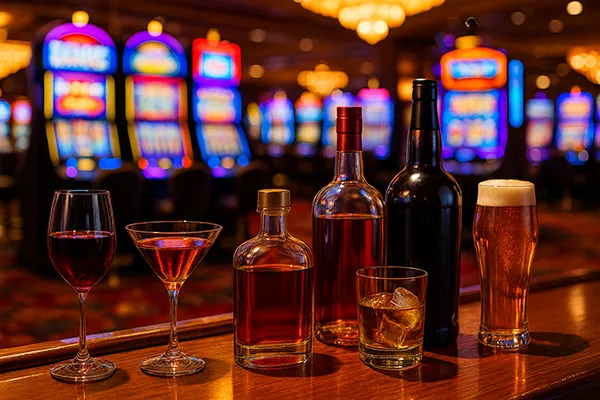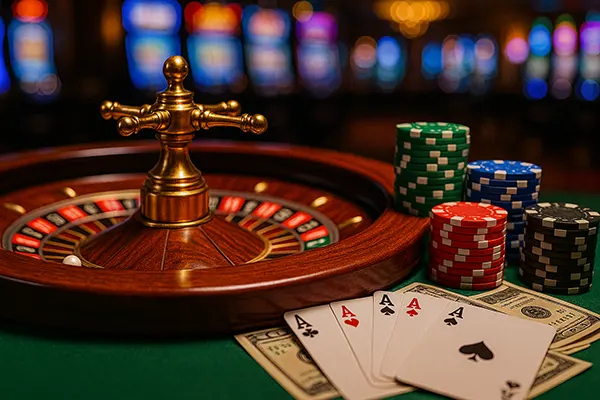
How Alcohol Branding Influences Player Behaviour in Modern Casinos
The connection between alcohol branding and player behaviour in casinos is deeper than it might appear. Modern casino environments often combine visual stimulation, emotional engagement, and subtle marketing cues. Alcohol brands, through their design and messaging, play a powerful role in shaping the mood and decisions of gamblers. Understanding this relationship helps explain how branding affects player psychology, game participation, and even risk perception.
The Power of Alcohol Branding on Player Emotions
Branding of alcoholic beverages goes far beyond a simple logo or bottle design. It carries emotional weight and social meaning. In casinos, premium alcohol brands often symbolise luxury, success, and confidence — values deeply connected with gambling itself. Players who consume or even see these brands may feel more sophisticated or daring, which can subtly influence their choices at the table.
For instance, a glass of aged whiskey presented in elegant glassware may encourage a player to act with confidence, even when taking bigger risks. The sensory aspects — colour, aroma, and presentation — stimulate reward centres in the brain, heightening the thrill of the experience. This emotional connection between drink and play can make gambling moments more memorable and psychologically reinforcing.
Brands strategically use these associations to build identity and loyalty. Casinos often collaborate with alcohol companies for co-branded experiences, further merging two forms of entertainment that thrive on emotion and perception. Such partnerships are not coincidental — they are part of a deliberate design to enhance engagement and extend time spent gambling.
Visual Style and Its Psychological Impact
Visual identity plays a major role in how alcohol brands affect gamblers. Colours such as gold, red, and black — often found in both casino interiors and alcohol packaging — evoke energy, wealth, and excitement. These tones stimulate alertness and optimism, making players more susceptible to impulsive behaviour.
Marketing studies have shown that even minimal exposure to alcohol-related visuals can increase risk-taking tendencies. In a casino, where decision-making happens quickly, the sight of familiar alcohol branding can subconsciously encourage players to continue betting. This psychological phenomenon, known as “priming,” creates an environment where branded products act as subtle behavioural triggers.
Lighting and decor also play a part. A bar illuminated with warm tones and elegant branding enhances comfort and reduces stress, which can lead to longer gaming sessions. When alcohol imagery is integrated smoothly into the casino’s aesthetic, it strengthens the immersive experience without players consciously realising it.
Marketing Strategies Behind Alcohol Presence in Casinos
Alcohol marketing in casinos is not random — it follows structured psychological and economic principles. Brands often target casino venues because of their demographic alignment: adults seeking leisure, excitement, and luxury. Exclusive promotions, premium bottle displays, and branded events are designed to appeal to high-spending guests.
Some casinos employ loyalty programmes where premium alcohol acts as a reward or status marker. This approach strengthens emotional attachment and incentivises players to spend more to reach higher levels. Alcohol thus becomes not just a product but a symbol of belonging and recognition within the gaming environment.
Furthermore, sponsorships and collaborations between casinos and alcohol companies reinforce brand presence. From signature cocktails to limited-edition bottles, such marketing integrates seamlessly into the entertainment atmosphere. The combination of sensory pleasure and perceived exclusivity creates a potent driver for both alcohol sales and gaming engagement.
Behavioural Influence and Responsible Consumption
While alcohol branding undeniably enhances the entertainment value of casinos, it also raises questions about responsibility. The psychological effects of alcohol — increased confidence, reduced inhibition, and distorted risk perception — can lead to impulsive decisions. This is why many casinos implement policies promoting moderate drinking and awareness campaigns.
Responsible gambling frameworks now recognise the role of alcohol in influencing player behaviour. Some modern casinos partner with behavioural scientists to ensure that marketing and service strategies remain ethical. For example, offering low-alcohol alternatives or visibly displaying responsible drinking messages helps maintain balance between enjoyment and safety.
Ultimately, the connection between alcohol branding and player behaviour reflects the fine line between entertainment and overindulgence. Transparency, ethical marketing, and clear boundaries are key to ensuring that branding enhances rather than exploits the gaming experience.

Trends and Future of Alcohol Branding in Casino Environments
As casino culture evolves, so does the approach to alcohol marketing. By 2025, brands are shifting from aggressive promotion towards lifestyle storytelling, focusing on authenticity and experience. Sustainable practices and health-conscious options, such as low-calorie or alcohol-free beverages, are gaining attention even in casino settings.
Technology also plays a part. Augmented reality (AR) bar menus, branded digital lounges, and personalised drink recommendations are being introduced to enhance engagement. These innovations blend digital interactivity with traditional brand appeal, allowing players to connect with products in new ways without overwhelming the gaming focus.
In the coming years, the emphasis will likely be on responsible yet emotionally engaging branding. Casinos and alcohol companies will need to balance commercial goals with ethical obligations, ensuring that visual and emotional stimulation enhances well-being and enjoyment rather than manipulation.
Ethical Marketing and the Role of Regulation
Governments and regulatory bodies are increasingly scrutinising how alcohol is promoted in gambling environments. The integration of branding must now comply with responsible marketing codes to protect consumers from excessive influence. This includes guidelines on advertisement placement, sponsorship transparency, and the promotion of alcohol-free alternatives.
Casinos, in turn, are adapting by introducing designated alcohol-free zones and highlighting moderation campaigns. These efforts aim to maintain a safe and inclusive space where players can enjoy the entertainment experience responsibly. Ethical branding is no longer just a legal requirement — it is a key aspect of corporate reputation and consumer trust.
As the industry matures, collaboration between alcohol producers, casino operators, and regulators will define a new standard of accountability. The future lies in creativity that respects human psychology, fostering enjoyment without exploiting vulnerability. This balance will determine how both industries sustain their appeal and credibility in a changing cultural landscape.
